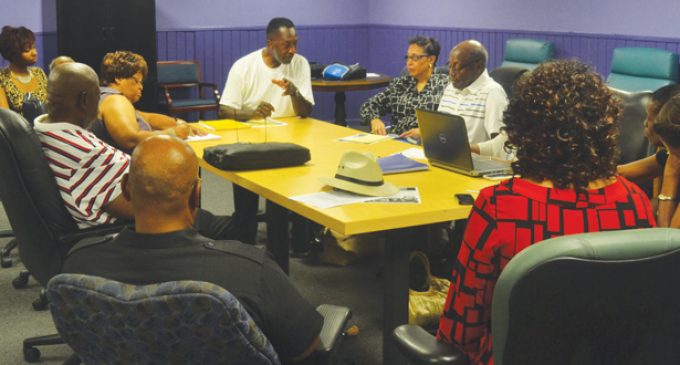Plaintiffs optimistic about decision in N.C. voting rights trial in W-S

In above photo: Rev. Dr. William Barber gives his closing remarks about the trial that ended July 31. (Photo by Todd Luck)
Legal hearing has ended, with a ruling to come later
After a three-week trial, N.C. NAACP vs. McCrory came to a close last Friday, July 31, as both sides gave their closing arguments.
The N.C. NAACP, The League of Women Voters, U.S. Justice Department and other groups challenged the state’s voting reform law, House Bill 589.
Judge Thomas Schroeder, who had many questions for both sides during final arguments, is expected to rule on the case later in the year.
Plaintiffs argued that Republican lawmakers crafted the law knowing it would suppress the vote of young and minority voters, who are likely to vote Democratic, by scaling back or abolishing voting measures that those groups used disproportionately.
The lawyers representing the state said there was no discrimination or disenfranchisement, pointing to how black turn out and registration was higher in 2014, after the law went into effect.
After the trial, N.C. NAACP President Rev. Dr. William Barber II gave his own rebuttal to the state’s closing arguments in front of the Federal Building, where the trial was held.
“Just because you overcome a barrier, does not mean that barrier is constitutional,” said Barber, using an example of an increase in graduation rates at segregated schools in the Jim Crow Era did not make segregation constitutional.
Thomas Farr, an attorney representing the state, said during closing arguments that the plaintiffs simply hadn’t made their case.
There is no constitutional obligation to provide the provisions that where shortened, like early voting, or done away with, like out-of-precinct voting, pre-registration for teens or same-day registration.
Many states don’t offer these services, he pointed out.
He said election laws didn’t have to take into account the societal inequalities that the plaintiffs pointed out, like African-Americans being more likely to have less education and access to transportation.
Daniel Donovan, one of the four attorneys who closed for the plaintiffs, said that the provisions targeted by the voting law were “not mere convenience” but that they helped voters overcome obstacles and acted as failsafes for them.
The case already went before Judge Schroeder last year, as plaintiffs asked for an injunction to prevent the new voting law from being implemented in the 2014 election.
Schroeder ruled against them, but was reversed by the Fourth Circuit Court of Appeals.
The Supreme Court reversed the circuit court’s decision, allowing the law to go into effect and returning the case to federal court.
Donovan went over the Fourth Circuit’s ruling, which said that the “totality of circumstances,” including considering past practices and previous changes to voting laws, such as changes that made it easier to vote, must be taken into account.
He said the circuit court also ruled that voting can’t be burdened based on a remote, theoretical threat such as voter fraud, which was very rare, several witnesses have testified during the trial.
Donovan said North Carolina was the first state to implement and repeal same-day registration.
“No other state has tried that and that’s why this case is so important.” he said.
He urged the judge to look at burdens placed on the voters, not the turnout of one high profile election.
One slide he showed compared the $10 million in ads in the 2010 midterms to the $111 million in ads in the 2014 midterm, spent largely on the Kay Hagen versus Thom Tillis Senate race, which was the most expensive race in the country.
He compared the higher turnout for that one election to a game where one sports team had more players than their opponents: the team with fewer players may still win, but that doesn’t mean they weren’t burdened.
Section 2 of the Voting Rights Act, which the plaintiffs are suing under, doesn’t require them to wait for a disparity to happen, he said.
Donovan said the suit against the law was filed the day it went into effect to prevent what history has shown are the results of such laws.
Plaintiffs are asking for the judge to strike down House Bill 589 and return the voting laws to the way they were before.
Schroeder said that sounded like Section 5 of the Voting Rights Act, a pre-clearance provision for voting law changes in states and counties with a history of discrimination that was struct down in 2013 by the Supreme Court.
The state agreed, but plaintiffs argued the judge has the authority under Section 2 to strike down the law.
Schroeder said there was no doubt the measures affected by House Bill 589 were disproportionately used by African-Americans.
He said the bill made voting harder and the government shouldn’t be in the business of making things harder, which made him wonder if lawmakers had an ulterior motive.
Schroeder, along with questioning the claims on both sides, also asked what a ruling for the plaintiffs would look like.
He asked how would he know when North Carolina is no longer in violation of the Voting Rights Act?
He expressed concerns that such a ruling may make it difficult for states to change their election laws without getting sued.
After the trial, Barber and the plaintiffs’ attorneys said they were encouraged that the judge’s acknowledged that the law made it more difficult to vote.
They expressed confidence that they will win.
“We leave our hearts here in North Carolina with the belief that we shall overcome,” said Donita Judge, senior attorney for the Advancement Project, which represented the N.C. NAACP.
No date was set for the voter ID portion of the case, which has yet to be heard after a new law softened the ID requirements for voters.










